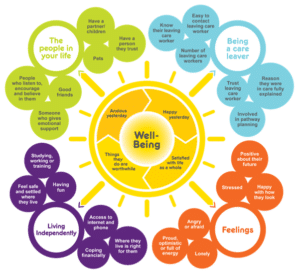Relational Practice: Care experienced young people’s views on relationships
Key Learning from care experienced young people’s views on relationships
The Bright Spots Programme has worked with care experienced young people to explore what makes life good. Central to their wellbeing is the availability of good and supportive relationships. What they identify as important may not ordinarily feature in discussions and service design plans: not feeling lonely, trusting workers, having pets, knowing there is someone who believes in you, having fun and a good friend. These, and other things, make up the Your Life Beyond Care well-being indicators (measured by an online survey).

So far over 10,000 care leavers have shared their views. Findings show that most identify someone who gives them emotional support, but these networks are often small: about 1 in 20 feel they have no support from anyone and around 1 in 5 get emotional support from only one source. Nearly one in ten report they only have support from their leaving care worker (support which is most likely constrained and time-limited). Many share they feel lonely; with one in five saying they feel this way all or most of the time. Friends are often a top source of emotional support, and 85% of care leavers have a really good friend, but this is lower compared to older children still in care and young people in the general population. Those care leavers who don’t have a friend are more likely to report struggling financially, not feel settled at home, or have a disability.
All the things asked about in the Bright Spots Your Life Beyond Care survey are important, but analysis shows that some things are more strongly associated with well-being. These are areas where we should pay particular attention: developing friendships, building and maintaining trusting relationships and addressing loneliness.
Listening to young people’s views the message is clear: relationships are pivotal to their quality of life and emotional support is as vital as practical help, but they also tell us how the care system and those who support them don’t always prioritise these.
We can all make changes so that relational working and ‘interdependence’, building and maintaining networks of support, is more central to how we think and act. Relationships for care experienced young people cannot be left to chance, nurturing and supporting them must be part of what everyone who works with care leavers does.
The Resources: Learning from the programme
- Coram Voice’s Resource Bank includes examples of how local authorities have used their Bright Spots findings to develop and change practice. It includes examples of working in more relational ways:
- Oldham – building trust between workers and care experienced young people;
- Stockport – way to support young people to maintain contact with their worker after a role change
- East Riding – created dance workshop opportunities and set up a football group after care leavers felt this would help combat loneliness
- Young People’s Benchmarking Forum’s In Their Own Words: Communities of Support report shares the views of 200+ care experienced individuals around communities of support & identifies local and national asks for action.
- Lots of other resources help us understand more about young people’s views on relationships:
- Laura Beveridge’s TED Talk, Kids in Care: Let’s Start a Revolution!, highlights that care leavers often feel a sense of abandonment, as the care system tends to focus on practical needs while emotional ones, like love and belonging, are neglected.
- Voices creative writing competition: Happiness in dark places (poem about friendship formed during time in care)
- Resources by Staf – how to build relationships with young people
- Falkirk Relationships First work (including short films e.g. why we need to better enable relationships with young people as they leave care)
- Care Leaders Podcast: Relationships
- Conversations with care leavers: relationships in the care system (Children’s Commissioner podcast)
- Brent Care Journeys: Partnership with people model
- Research evidence echoes what young people say:
- Atkinson, C. and Hyde, R. (2019) Care leavers’ views about transition: a literature review, Journal of Children’s Services, Vol. 14 Issue: 1, pp.42-58.
- Baker, 2017, Care leavers views on their transition to adulthood, Coram Voice
- Winter, 2015, Supporting positive relationships for children and young people who have experience of care, IRISS
How might you use these resources?
You could use these resources to prompt discussion about working more relationally in your organisation (share them with colleagues, discuss them in supervision and in a team meeting). Jump in and make a small change. Go for it, start with a small, focused project!
Some ideas for action:
- Looking at the Bright Spots well-being indicator diagram and findings, reflect together on these questions:
- Are there areas your care leavers say are going well?
- What are the areas that need improvement and focus?
- What makes the life of your young people good? How do you know this?
- How do you / your organisation currently hear (and respond to) young people’s views on their relationships?
- Is there space for conversations about feelings of loneliness; friendships and trusted adults?
- How are endings negotiated (if your support to the young person will finish) – is there scope for continuing relationships when this is wanted?
- Do you check out what young people value about their relationship with you?
- Appraise how the relationships which care leavers identify as important to them (friends, family, carers, workers and others) are nurtured and supported in your organisation?
- Watch and discuss the Ted Talk from Laura Beveridge, listen to one of the podcasts or read the poem together in a team meeting.
- Thinking about the concept of interdependence, are there small changes you could make to your policies and procedures, and life skills work that prompt thinking about what it means to be interdependent, as well as independent?
Where can I find out more?
Below you can watch the recording of our webinar accompanying this blog.
This blog is part of a series of resources drawing on the peer learning programme and containing young people’s views, evidence and case studies of why working relationally is important for practice with care experienced young people.
Find out more: Relational Practice Resources
